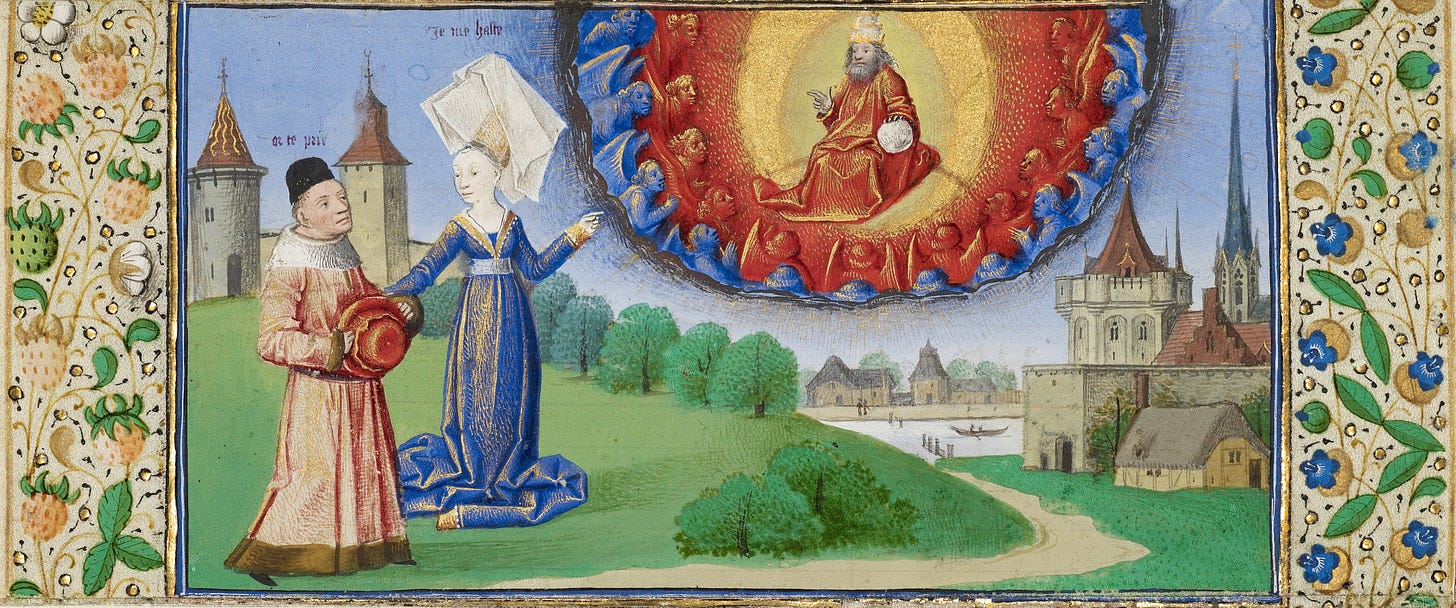A spiritual journey with Boethius: Part 3
In this final part, Boethius moves from despair to hope; trusting in the goodness of God.
Boethius, Book 4: The Order Beneath the Chaos
Henri De Vulcop
Boethius has come a long way, but now a deeper question emerges, one we all struggle with from time to time:
If God is good, if He is the very source of all goodness—then why does evil flourish? Why do the wicked prosper while good and even innocent people suffer?
Lady Philosophy does not flinch. She tells Boethius that Divine Providence is real, but it cannot be measured by outward appearances. We only see part of the plan; God sees the whole.
Book Four of The Consolation is deeply theological. Boethius echoes the wisdom of the Psalms: “Do not fret because of evildoers,” the Psalmist warns, for “they will soon fade like the grass” (Psalm 37). Sometimes, what looks like reward might in fact be punishment, and what looks like punishment might be mercy. It’s all part of a providential order much deeper and more complex than we can possibly imagine.
Evil people are not at all powerful. In fact, their wickedness is their own punishment. It deforms them and draws them further and further from the Good. The more they sin, the more they cease to be who they were created to be. Instead, they become enslaved to desires that will never fulfill them. They may appear to flourish, but they can never be truly happy because they have turned away from God.
At the same time, Lady Philosophy offers a word of comfort to the righteous who suffer: hardship may be a form of divine preparation that purifies the heart, trains the soul, and leads us to a deeper union with God. As Hebrews 12:6 says, “For the Lord disciplines the one He loves, and chastises every son whom He receives.”
Lady Philosophy does not offer easy answers. She calls us to a higher vision. Justice, she says, is never absent but sometimes it unfolds on a cosmic scale we cannot comprehend. We are called to trust in God’s will and learn to see the world as he sees it.
Book 4, Part 1:
Book 4, Part 2:
Boethius, Book 5: The Eternal Now
One question still troubles Boethius:
If God sees everything, including the future, can human beings truly be free? In other words, if God already sees what we will choose, then are we really choosing at all?
Lady Philosophy recognizes that the prisoner is struggling to reconcile free will with the idea that our lives are fully known by God. Her answer is breathtaking: God is eternal, which is to say that he exists outside of time. We humans experience time as a sequence of events in the past, present, future. Meanwhile, God sees all things at once in a single, eternal present. He is not bound by befores or afters. He simply is—the great “I Am.” His foreknowledge does not cause our choices. He sees them, yes, but we make them freely. And when we pray, the goal is to delight in Him, and align our hearts with His will.
Think of it this way: your memories do not force the past to happen. God’s knowing is like that, but perfect, eternal, and unchanging—and it does not impose necessity.
When you watch someone stand up from a chair and walk across a room, you see them, but you do not make them do it. Or when you watch an athlete run a race, you are but an observer. You do not make them run.
We are moral agents, not puppets. Boethius is reminding us to live our lives as if our choices matter, because they do. Divine omniscience and human freedom coexist.
Every time I read the last lines of The Consolation, I wonder if Boethius had more to say. Was he interrupted and taken to face his executioner?
Or did he set his pen down at the appointed time?
I take comfort that his soul was not bound by weariness, sadness, or things of the world. He had come to see himself, and his place in God’s eternal design, with utter clarity. That may be the deepest consolation of all. And it is his gift to us.
In The Consolation, Boethius left behind a path from sorrow to insight, from illusion to truth, and from despair to hope. And in a world all-consumed by false pathways to happiness, and where the wheel of fortune still seems to turn, his witness reminds us that we are not defined by circumstances, but by how we seek, love, and align our hearts with God.
Book 5, Part 1:
Book 5, Part 2:
Written and produced by The Greats Story Lab™, lead by Dr Sarah-Jane Murray who is a tenured Professor at Baylor University in Austen, and their Head Imagineer - Courtney Becker. Their goal is to help a new generation of people engage with some of the greatest stories ever told using new media or as they have coined edumedia. The Greats Story Lab™ has been nominated winners of 18 juried awards including the gold Tellys. Sarah-Jane Murray is herself Emmy nominated and has been lauded in the Times Literary Supplement for her work on the 3 volume; The Moralized Ovid (D.S. Brewer, 2023), with co-translator Dr Mathieu Boyd.

